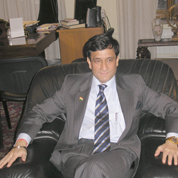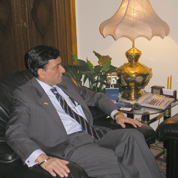Mutual striving towards ‘diplomatic nirvana’ in bilateral relationships

India and Russia have a long history of fruitful cooperation dating back to the Soviet era. How would you briefly characterize the bilateral ties today?
The tradition of bilateral cooperation between Moscow and New Delhi goes back over 60 years, virtually from the time India got its independence. This relationship has been a case of steady evolution, without any ups and downs. What we are seeing today is the culmination or continuation of this good tradition, and I must note that the relationships between Moscow and New Delhi are in a better shape than they have ever been. I can say this with certainty because I have been observing these diplomatic processes first hand for the better part of the past 40 years.
As the old saying goes, there is no limit to perfection. So, if you were to boost the bilateral relationship further, despite it being at its historical best, what would you concentrate on?
No, let me get this clear. If my previous answer gave the wrong impression that we had reached a sort of ‘diplomatic nirvana’ in our bilateral relations, of course, that is not case, as we haven’t. There is still room for improvement, especially in the economic aspect, which is currently lagging significantly behind the robust political, diplomatic, defense and cultural components of our bilateral ties. The political leaderships of both countries are also aware of this, and are, therefore, paying special attention to the economic aspect. The two sides have ambitious targets, projects and lots of ideas on how to bolster the economic relationship to be on par with the other components of our bilateral ties. Another area is to encourage more travel among citizens of both countries. Of course, travel is growing at reasonable rates between our countries, averaging 10% annually on each side, but we need to boost this further by encouraging more people-to-people exchanges between Russia and India.
Despite the robust relationships in the political aspect, economic interactions, as measured by trade turnover, pales conspicuously in comparison. What is the reason for this discordance?
I would say that there are two main blocs of reasons. The first is the objective situation in which we have found ourselves. This includes poor transportation, weak banking sectors and other infrastructural deficiencies that limit the volume of economic interactions. The second bloc of reasons stems from the fact that trade between India and Russia till the 1990s, when the Soviet Union broke up, was an officially ‘managed trade’ based mainly on barter arrangement between two governments and state-owned companies. With the collapse of the Soviet Union, this system also broke down, and throughout much of the 1990s, no new system was installed to replace it, a situation exacerbated further by the fact that most Indian private companies had little or no direct business contacts with the Soviet Union.
"The relationship between India and Russia, now at its historical best, has been a case of steady positive evolution. I can say this with certainty because I have been observing these processes first hand for the past 40 years.”
Consequently, the volume of economic interaction between the countries fell to the lowest levels in the early period of the post-Soviet era. It was only later that Indian private companies increasingly started looking at Russia, a strategic political decision made by the Indian government that encourages our companies to focus more on what we call ‘our extended eastern neighborhood.’ This led to rapid growth in our economic ties with Russia as more and more Indian companies turned to Russia and vice-versa. Today, the volume of Indian investments in Russia is about $3.5bln, with the lion’s share going to the energy sector, while Russian investments in India total about $1bln. Now, with the biggest Indian private sector companies coming into Russia by opening branches or setting up representative offices in the country, the rate of economic cooperation is expected to be accelerated.
India and Russia have pledged to boost trade turnover to $10bln by 2010. This raises two question: a) does this figure reflect these countries’ potential, and b) will this goal still be attained by the set deadline, given the current global crisis?My answer to both questions is yes and yes. The current growth in trade turnover is very satisfactory, averaging about 30-40% per year for the past few years. As I have noted, the private sectors of both our economies have now become more familiar to each other than ever before, and this should spur trade. For this to happen, our governments have taken concrete steps, including the creation of the Indo-Russian Forum on Trade in addition to the Intergovernmental Commission on Economic Cooperation. These two powerful organs have been tasked with the responsibilities of boosting our bilateral economic ties. Also, a CEO Council, which brings together the most influential business leaders in both countries, was recently set up, and again, the goal here is to boost the economic interactions between businesses at the highest levels. With all these programs in place, and also taking into consideration the robust political relationships between our leaders, I would say that I’m very optimistic that we can certainly meet this target by the set deadline, irrespective of the current global crisis.
Goldman Sachs named India among the BRIC countries quartet that will lead the global economy, effective from 2050. Do you see India rising to the lofty challenges of a global leader?

I would start by saying that there is a lot of talk about the new emerging markets. With regard to India, I would like to highlight the following features. First of all, India has a functioning democracy and over a $1trn thriving economy. The second is that, unlike other growing and developing economies, India is not an export-dependent economy, meaning that our economic growth is more dependent on the domestic demand for services, consumption and investments. Another feature is the emergence of an entrepreneurial class. Historically, India has always been known for its entrepreneurial acumen, but today, this feature is stronger than ever before, and this is the foundation of our modern economy. Apart from these, you also have what is called ‘the soft business infrastructure,’ which is well developed in India. This includes the financial system, one of the most efficient in the world, and the national stock exchange, which is the second largest in the world in terms of number of transactions and one of the fastest in terms of transaction times, thanks to judicious use of the latest technologies. Obviously, the picture of the modern Indian economy will not be complete if I don’t mention its weaknesses, the biggest of which is our poor business and social infrastructure. Our government is aware of this and is taking measures, including earmarking up to $300bln over the next 15 years, or an average of $20bln per year, to fix these problems. So, to answer your question briefly, I would say yes, India is ready to play roles that are commensurate with its potential on the global stage.
As India’s topmost diplomat in Russia, you must have a very tight business schedule. Does such busy regime allow you to have some free time for yourself, family and personal hobbies?
Though my official job schedule is really tight, I do have some time for myself, family and favorite hobbies. For instance, one of my favorite hobbies is golf, so if the Moscow weather is good, I go golfing, especially in summer. The other is astronomy. I have a telescope, which I use to gaze at and observe the stars, especially on cloudless nights.












 Web design,
Web design,